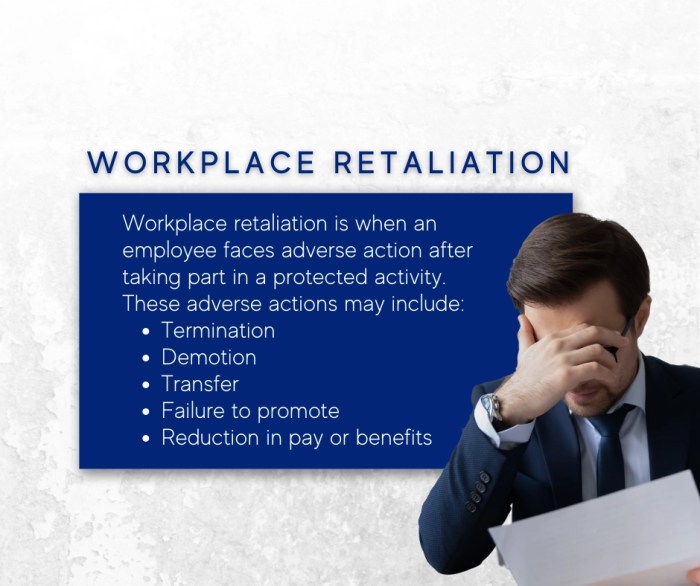Attorney for retaliation: a crucial ally in safeguarding your rights against unlawful retaliation. Retaliation, a serious offense, occurs when an employer punishes an employee for exercising their legal rights, such as reporting discrimination or harassment. Navigating the complexities of retaliation cases requires the expertise of an experienced attorney.
Our skilled attorneys possess a deep understanding of retaliation laws and are dedicated to protecting your interests. We meticulously gather evidence, build a compelling case, and aggressively represent you in court or negotiations. With our unwavering commitment, we strive to achieve justice and secure the compensation you deserve.
Definition and Overview
Retaliation in a legal context refers to actions taken against an individual for exercising their legal rights or reporting illegal activities. These actions can range from termination of employment to demotion or other forms of adverse treatment. The concept of retaliation is crucial for protecting individuals from being punished for standing up for their rights or reporting wrongdoing.
Common Types of Retaliation Cases
Common examples of retaliation cases include:
- Termination of employment after reporting discrimination or harassment
- Demotion or denial of promotion after filing a complaint
- Unfair performance evaluations or negative treatment after exercising a protected right
- Changes in job duties or responsibilities to make the job more difficult
- Creation of a hostile work environment after reporting misconduct
These are just a few examples of the many ways retaliation can manifest in the workplace. It’s important for individuals to be aware of their rights and the protections available to them under the law to prevent and address retaliation.
Legal Protections
The law provides robust protections for employees against retaliation. These protections aim to prevent employers from retaliating against employees who exercise their legal rights, such as reporting discrimination, harassment, or unsafe working conditions.
To establish a retaliation claim, employees must prove several elements:
Protected Activity
- The employee engaged in a protected activity, such as reporting discrimination, filing a complaint, or requesting a reasonable accommodation.
Adverse Action
- The employer took an adverse action against the employee, such as firing, demoting, or reducing pay.
Causation
- There is a causal connection between the protected activity and the adverse action. The employee must show that the employer retaliated because of the protected activity.
Employer Knowledge
- The employer had knowledge of the protected activity when it took the adverse action.
Employer Liability
Employers are legally liable for retaliation if they take adverse actions against an employee who has engaged in protected activity. Protected activity includes reporting discrimination or harassment, participating in an investigation, or filing a complaint with the Equal Employment Opportunity Commission (EEOC).
Employer liability can arise even if the employer was not aware of the employee’s protected activity.
Examples of employer actions that may constitute retaliation include:
Unfavorable Performance Evaluations
- Giving an employee a negative performance evaluation after they have reported discrimination or harassment.
- Denying an employee a promotion or pay raise after they have participated in an investigation.
Changes in Work Assignments
- Transferring an employee to a less desirable work assignment after they have filed a complaint with the EEOC.
- Reducing an employee’s hours or responsibilities after they have reported discrimination or harassment.
Termination of Employment
- Firing an employee after they have reported discrimination or harassment.
- Laying off an employee after they have participated in an investigation.
Role of the Attorney
In retaliation cases, an attorney serves as an advocate and legal guide for clients who have been subjected to adverse actions by their employers due to engaging in protected activities. Attorneys play a crucial role in protecting the rights of employees and ensuring that employers adhere to anti-retaliation laws.
Finding and Selecting an Experienced Attorney
Finding an experienced attorney is essential for maximizing your chances of success in a retaliation case. Here are some tips for selecting the right attorney:
- Seek Referrals:Ask friends, family, or colleagues for recommendations of attorneys who specialize in employment law.
- Research Online:Use online directories and search engines to find attorneys in your area who focus on retaliation cases.
- Check Credentials:Look for attorneys who have a strong track record of success in handling retaliation cases.
- Schedule Consultations:Meet with potential attorneys to discuss your case and assess their knowledge, experience, and communication skills.
– Discuss the importance of gathering evidence in retaliation cases.
Gathering evidence is crucial in retaliation cases to prove that an employer has retaliated against an employee for engaging in protected activity, such as reporting discrimination or harassment.
Evidence helps establish a causal connection between the protected activity and the adverse employment action taken against the employee. Without sufficient evidence, it can be challenging to prove retaliation and hold the employer accountable.
Types of Evidence in Retaliation Cases
Various types of evidence can be relevant in retaliation cases, including:
- Documents:Emails, memos, text messages, and other written communication can provide direct evidence of retaliation. For example, an email from a supervisor stating that an employee is being demoted because they reported harassment.
- Witness Testimony:Colleagues, supervisors, or other individuals who have knowledge of the events in question can provide valuable testimony about what they saw or heard.
- Physical Evidence:Surveillance footage, personnel files, and other physical evidence can corroborate witness testimony or provide additional context.
Gathering and Preserving Evidence
To effectively gather and preserve evidence in retaliation cases, it is important to:
- Document everything:Keep a record of all communications, meetings, and other interactions related to the retaliation.
- Preserve electronic evidence:Save emails, text messages, and other electronic communications in a safe and accessible location.
- Identify potential witnesses:Make a list of individuals who may have witnessed the retaliation or have knowledge of the relevant events.
- Seek legal advice:An attorney can provide guidance on the types of evidence to gather and how to preserve it effectively.
Role of an Attorney in Gathering Evidence
An attorney plays a crucial role in gathering evidence in retaliation cases. Attorneys can:
- Issue subpoenas:Attorneys can obtain documents and other evidence from third parties through subpoenas.
- Interview witnesses:Attorneys can interview witnesses to gather their testimony and assess their credibility.
- Analyze evidence:Attorneys can review and analyze evidence to identify patterns and build a strong case for retaliation.
- Present evidence in court:Attorneys present evidence in court to prove the employee’s case and hold the employer accountable.
Building a Case

Building a strong retaliation case requires a comprehensive approach that involves gathering evidence, organizing and presenting it effectively, and developing a persuasive legal strategy. By following a systematic process and adhering to ethical guidelines, attorneys can effectively represent clients in retaliation cases.
Steps in Building a Strong Retaliation Case
- Gather Evidence:Collect all relevant evidence, including documents, emails, witness statements, and any other materials that support the client’s claim of retaliation.
- Organize and Present Evidence:Organize the evidence in a logical and coherent manner, ensuring that it is easily accessible and understandable to the jury.
- Write a Persuasive Legal Brief:Summarize the evidence and legal arguments in a well-written legal brief that Artikels the case’s strengths and weaknesses.
- Cross-Examine Witnesses:Prepare for and conduct effective cross-examinations of witnesses, challenging their credibility and eliciting favorable testimony.
- Rebut Opposing Counsel’s Arguments:Anticipate and prepare to counter opposing counsel’s arguments, presenting evidence and legal reasoning to support the client’s case.
- Present Closing Arguments:Craft persuasive closing arguments that summarize the evidence and legal arguments, urging the jury to find in favor of the client.
- Tailor Case Strategy:Adapt the case strategy to the specific facts and legal issues involved, ensuring that the approach aligns with the client’s objectives and the applicable law.
- Use Expert Witnesses and Resources:Consider using expert witnesses or other resources to strengthen the case, providing specialized knowledge or support for the client’s claims.
- Ethical Considerations:Maintain the highest ethical standards throughout the case, ensuring that all actions are in the best interests of the client and comply with legal and professional obligations.
Negotiation and Settlement
Negotiation and settlement are often crucial steps in retaliation cases. Engaging in negotiation can help both parties avoid the costs and uncertainties of trial, while also providing an opportunity to resolve the dispute amicably.
Evaluating Settlement Offers
When evaluating a settlement offer, it is important to consider the following factors:
- The strength of your case
- The potential damages you could recover at trial
- The costs of going to trial
- The risks and uncertainties of trial
- Your client’s goals and objectives
Provide an Overview of the Different Stages of a Trial
A trial is a formal proceeding in which evidence is presented to a judge or jury to determine the guilt or innocence of a defendant or to resolve a dispute between parties. There are several stages involved in a trial, each with its own purpose and procedures.
The Pleadings
The pleadings are the initial documents filed with the court that Artikel the claims and defenses of the parties. The plaintiff (the person who is suing) files a complaint, which sets forth the facts of the case and the legal basis for the claim.
The defendant (the person being sued) then files an answer, which admits or denies the allegations in the complaint and sets forth any defenses.
Discovery
Discovery is the process by which the parties exchange information and documents in order to prepare for trial. This process can include interrogatories (written questions that must be answered under oath), requests for production of documents, and depositions (oral examinations of witnesses under oath).
Motions
Motions are requests made to the court to take certain actions, such as dismissing the case, compelling discovery, or excluding evidence. Motions are typically filed in writing and are decided by the judge.
Trial
The trial is the formal proceeding in which the evidence is presented to the judge or jury. The trial begins with opening statements by the attorneys for the plaintiff and defendant, in which they Artikel their case and the evidence they intend to present.
The plaintiff then presents its case-in-chief, which includes calling witnesses and introducing exhibits. The defendant then presents its case, and the plaintiff may present a rebuttal case. After all the evidence has been presented, the attorneys give closing arguments, in which they summarize the evidence and ask the judge or jury to find in their favor.
Verdict
The verdict is the decision of the judge or jury. In a criminal case, the verdict is either guilty or not guilty. In a civil case, the verdict is typically a monetary award to the plaintiff.
Judgment
The judgment is the final order of the court. The judgment will typically include the amount of damages awarded to the plaintiff, as well as any other relief that the court has ordered.
Appeal
Either party may appeal the judgment to a higher court. The appellate court will review the record of the trial court and decide whether the trial court made any errors. If the appellate court finds that the trial court did make an error, it may reverse or modify the judgment.
Damages and Remedies
In retaliation cases, victims may be awarded various forms of damages and remedies to compensate for the harm they have suffered.
Types of Damages
Courts may award different types of damages, including:
- Compensatory Damages:Intended to reimburse the victim for financial losses, such as lost wages, benefits, and emotional distress.
- Punitive Damages:Awarded to punish the employer for egregious misconduct and to deter future retaliation.
- Nominal Damages:Granted when no actual losses have been incurred but the court recognizes the wrongfulness of the employer’s conduct.
Remedies
In addition to damages, courts may also impose remedies, such as:
- Reinstatement:Ordering the employer to restore the victim to their previous position.
- Back Pay:Awarding the victim lost wages and benefits due to the retaliation.
- Injunction:Prohibiting the employer from continuing to retaliate against the victim.
Determining Damages
When determining the amount of damages to award, courts consider factors such as:
- Severity of the retaliation
- Victim’s losses
- Employer’s financial resources
- Need to deter future retaliation
Time Limits
Victims must file a retaliation claim within a certain time period, known as the statute of limitations. This varies by jurisdiction, so it’s important to consult with an attorney to ensure timely filing.
Prevention and Best Practices
Retaliation is a serious problem that can have a devastating impact on employees and their careers. However, there are a number of steps that employers can take to prevent retaliation and create a culture of respect and fairness in the workplace.
Establishing Clear Policies and Procedures
One of the most important steps that employers can take to prevent retaliation is to establish clear policies and procedures against retaliation. These policies should be in writing and should be communicated to all employees. They should define what constitutes retaliation and what the consequences will be for employees who engage in retaliation.
Providing Training to Employees
In addition to establishing clear policies and procedures, employers should also provide training to employees on retaliation prevention. This training should help employees to understand what retaliation is, how to recognize it, and what to do if they are the victim of retaliation.
Creating a Confidential Reporting System
Employees who are the victim of retaliation may be reluctant to come forward for fear of further retaliation. To encourage employees to report retaliation, employers should create a confidential reporting system. This system should allow employees to report retaliation anonymously and should be investigated promptly and thoroughly.
Investigating and Taking Appropriate Action
When an employer receives a report of retaliation, it is important to investigate the report promptly and thoroughly. If the investigation finds that retaliation has occurred, the employer should take appropriate action against the employee who engaged in retaliation. This action may include discipline, termination, or even criminal prosecution.
Creating a Culture of Respect and Fairness, Attorney for retaliation
In addition to taking steps to prevent retaliation, employers should also create a culture of respect and fairness in the workplace. This culture should encourage open communication and feedback, promote diversity and inclusion, and provide opportunities for professional development and advancement.
Role of HR in Preventing and Responding to Retaliation
HR plays a critical role in preventing and responding to retaliation. HR professionals can help to develop and implement policies and procedures against retaliation, provide training to employees on retaliation prevention, and investigate reports of retaliation. HR can also help to create a culture of respect and fairness in the workplace.
Examples of Successful Prevention and Best Practices Programs
There are a number of examples of successful prevention and best practices programs that employers have implemented. These programs have helped to reduce retaliation and create a more positive and productive workplace.
Call to Action
Employers should take steps to prevent retaliation and create a culture of respect and fairness in the workplace. By doing so, they can create a more positive and productive workplace for all employees.
Case Studies: Attorney For Retaliation
Analyzing successful retaliation cases offers invaluable insights into effective strategies and key elements that contribute to favorable outcomes. By examining real-world examples, we can gain a deeper understanding of the legal complexities involved and the practical approaches that have proven successful in protecting the rights of employees.
In one notable case, an employee who reported workplace harassment faced retaliation in the form of demotion and reduced responsibilities. The employee meticulously documented the retaliatory actions and sought legal representation. The attorney effectively argued that the employer’s actions were motivated by the employee’s protected activity and violated the law.
The case was successfully resolved through a settlement that included reinstatement, back pay, and compensation for damages.
Key Elements of Successful Retaliation Cases
- Strong Evidence:Gathering compelling evidence is crucial. This includes documentation of retaliatory actions, emails, text messages, and witness statements.
- Timely Action:Promptly filing a complaint and initiating legal proceedings is essential to preserve the employee’s rights and prevent further retaliation.
- Skilled Legal Representation:An experienced attorney who specializes in retaliation cases can effectively navigate the legal complexities and advocate for the employee’s rights.
- Employer’s Intent:Proving the employer’s intent to retaliate is often challenging. Circumstantial evidence and a clear pattern of retaliatory actions can help establish intent.
- Damages:Successfully recovering damages for lost wages, emotional distress, and other losses can provide meaningful relief to the employee.
Industry Trends and Updates

The legal landscape surrounding retaliation is constantly evolving, influenced by court rulings, legislative changes, and evolving social norms. Understanding these trends and developments is crucial for attorneys navigating this complex area of law.
One notable trend is the increasing recognition of subtle forms of retaliation, such as isolation, negative performance evaluations, and changes in job responsibilities. Courts are becoming more receptive to claims that do not involve overt acts of discrimination but nevertheless create a hostile work environment.
Emerging Legal Issues
- Expansion of protected activities: Courts are broadening the scope of protected activities under retaliation laws, recognizing that employees may engage in protected activities even if they do not formally file a complaint or participate in an investigation.
- Increased focus on employer intent: While proving intent is still a challenge in retaliation cases, courts are placing greater emphasis on examining an employer’s motives and the context in which alleged retaliatory actions occurred.
- Rise of social media and technology: The use of social media and other electronic communications has created new challenges in retaliation cases, as employees may face retaliation for online activities related to their protected activities.
Best Practices
- Stay informed: Attorneys should stay abreast of the latest legal developments and trends in retaliation law to effectively represent their clients.
- Document evidence: Attorneys should meticulously document all evidence of alleged retaliation, including emails, text messages, and witness statements.
- Develop a strong case: Attorneys should build a strong case based on evidence and legal arguments, considering both the facts and the applicable legal principles.
- Explore alternative dispute resolution: Attorneys should consider alternative dispute resolution methods, such as mediation or arbitration, to resolve retaliation claims efficiently and cost-effectively.
Resources and Support

Retaliation can have a profound impact on victims, both emotionally and financially. It is important to know that there are resources and support organizations available to help victims of retaliation.
Legal Aid and Counseling
Many organizations provide free or low-cost legal aid to victims of retaliation. These organizations can help victims understand their rights, file complaints, and represent them in court. Counseling services can also be helpful for victims of retaliation, as they can provide emotional support and coping mechanisms.
| Organization Name | Contact Information | Services Provided |
|---|---|---|
| National Employment Lawyers Association (NELA) | (202) 232-2400 | Legal representation, counseling, and support |
| Equal Employment Opportunity Commission (EEOC) | 1-800-669-4000 | Investigate and resolve complaints of discrimination, including retaliation |
| American Bar Association (ABA) | (312) 988-5000 | Legal advice, referrals, and pro bono representation |
Tips for Accessing Resources
* Contact your local legal aid office or bar association.
- Search online for resources in your area.
- Ask your friends, family, or colleagues for recommendations.
- Be persistent. Don’t give up if you don’t find help right away.
Importance of Seeking Professional Help
Seeking professional help is important for victims of retaliation. A lawyer can help you understand your rights, file a complaint, and represent you in court. A counselor can provide emotional support and coping mechanisms.
“It is important for victims of retaliation to know that they are not alone. There are resources and support organizations available to help them through this difficult time.”
National Employment Lawyers Association
Table of State Laws
Retaliation laws vary from state to state, with different statutes of limitations, remedies, and enforcement mechanisms. The following table summarizes the key provisions of retaliation laws in different states.
This table provides a quick reference for attorneys and individuals who need to understand the legal landscape of retaliation laws in different jurisdictions. It is important to consult the relevant statutes and case law for the most up-to-date information.
State Laws
| State | Statute of Limitations | Remedies | Enforcement Mechanisms |
|---|---|---|---|
| Alabama | 1 year | Reinstatement, back pay, damages, attorney’s fees | Alabama Human Rights Commission |
| Alaska | 2 years | Reinstatement, back pay, damages, attorney’s fees | Alaska State Commission for Human Rights |
| Arizona | 180 days | Reinstatement, back pay, damages, attorney’s fees | Arizona Civil Rights Division |
| Arkansas | 1 year | Reinstatement, back pay, damages, attorney’s fees | Arkansas Civil Rights Commission |
| California | 2 years | Reinstatement, back pay, damages, attorney’s fees, injunctive relief | California Department of Fair Employment and Housing |
Glossary of Legal Terms

Retaliation cases involve complex legal terminology. Understanding these terms is crucial for both legal professionals and individuals involved in such cases. This glossary provides clear and concise definitions of common legal terms related to retaliation.
To ensure easy reference, we have compiled a comprehensive glossary of these terms. By familiarizing yourself with these definitions, you can better understand the legal framework surrounding retaliation and navigate the complexities of such cases effectively.
Adverse Employment Action
- Any action taken by an employer that has a negative impact on an employee’s employment, such as termination, demotion, suspension, or reduction in pay or benefits.
Protected Activity
- Actions taken by an employee that are protected by law, such as reporting discrimination, harassment, or illegal activities.
Causation
- The link between the protected activity and the adverse employment action. In retaliation cases, the plaintiff must prove that the adverse action was motivated by the protected activity.
Prima Facie Case
- A basic set of facts that, if established, creates a presumption that the defendant is liable for retaliation.
Retaliatory Harassment
- Conduct by an employer that creates a hostile or intimidating work environment in retaliation for protected activity.
Statute of Limitations
- The time limit within which a lawsuit must be filed. Retaliation claims typically have a shorter statute of limitations than other employment law claims.
End of Discussion
Retaliation is a grave injustice that undermines the fundamental rights of employees. Our attorneys stand ready to fight for your protection and ensure that your voice is heard. Contact us today for a confidential consultation and let us help you navigate the complexities of retaliation cases with confidence.
FAQ Guide
What is retaliation?
Retaliation occurs when an employer takes adverse action against an employee for exercising their legal rights, such as reporting discrimination or harassment.
What are the common types of retaliation?
Retaliation can take many forms, including termination, demotion, suspension, pay cuts, or changes in job duties.
How can an attorney help me with a retaliation case?
An experienced attorney can guide you through the legal process, gather evidence, build a strong case, and represent you in court or negotiations.
What are the potential damages in a retaliation case?
Damages in retaliation cases may include lost wages, emotional distress, and punitive damages.
What are the time limits for filing a retaliation claim?
Time limits vary by jurisdiction, so it’s crucial to consult with an attorney promptly if you believe you have been retaliated against.